The constantly ticking death clock in anime metroidvania Unsighted may be stressful, but I learned to love it
The cyberpunk soulslike lets you turn off its time limits, but I'm glad I didn't.
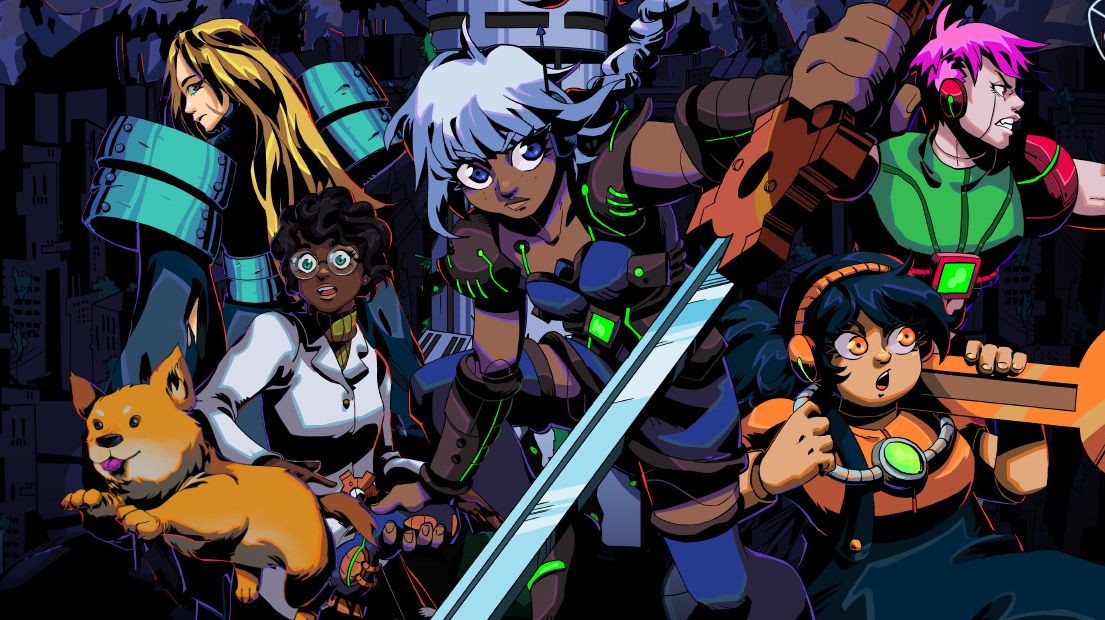
Time limits are stressful, and when you're playing a game to unwind at the end of the day they can seem out of place. I have enough deadlines in my life already, Videogame, what do you think you're doing adding to the pile? When I saw that Unsighted had an option to turn time limits off in its accessibility options, I was tempted to tick it. But I didn't, and they turned out to be one of the most memorable things about this wonderful game.
Unsighted is about robots who gain sentience after a mysterious crystal meteor crashes into Arcadia City. This sets off a war between robots and humans, because I guess we'd rather our vacuum cleaners and mining rigs didn't talk back or start demanding rights. You play one of the robots—the last combat android at the end of the war. The humans have control of the meteor, and have stopped it spreading the 'anima' that gives automatons free will. Without that, you and all your friends are doomed to become the mindless monsters called unsighted as your internal anima supplies run out one by one.
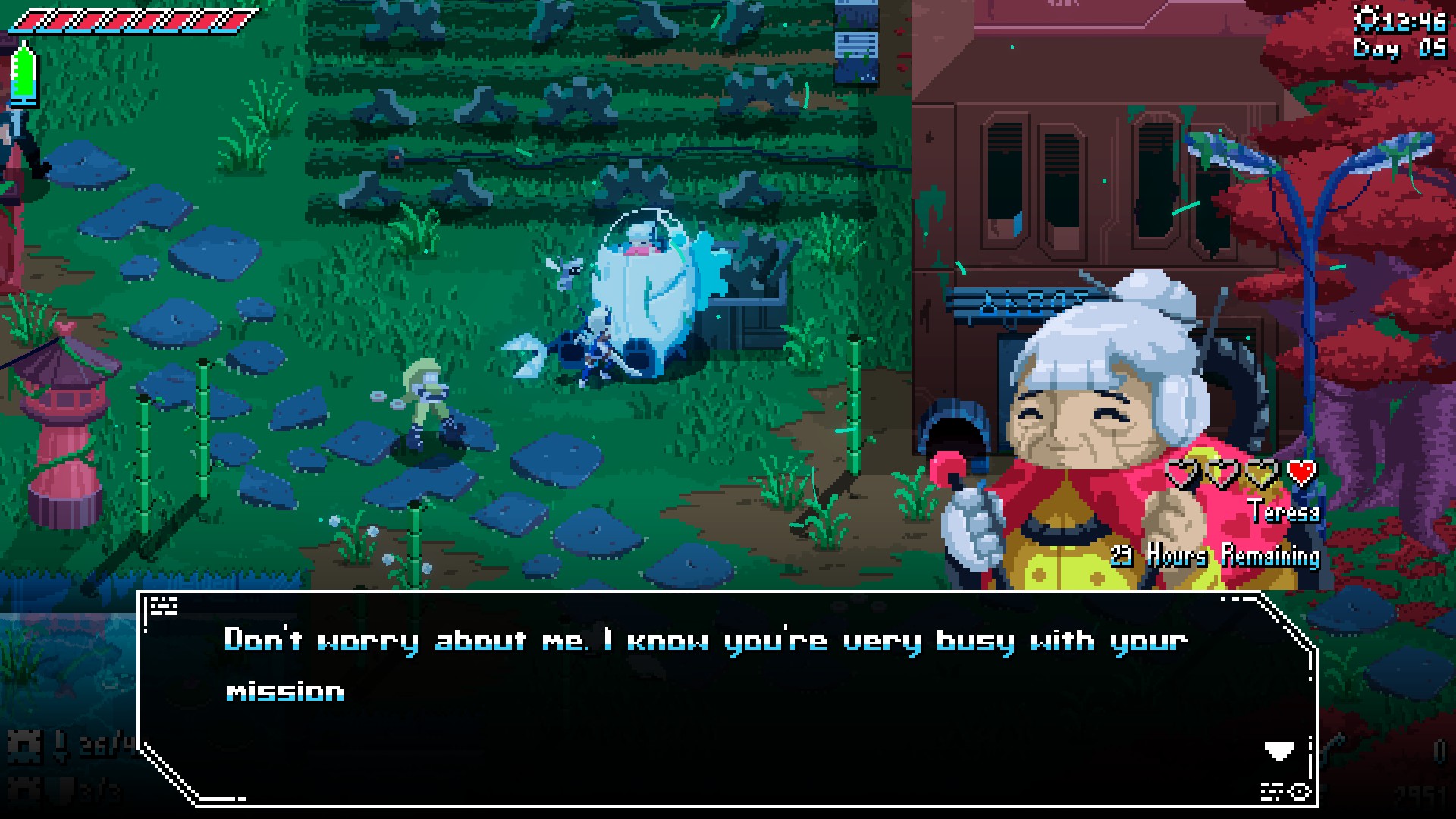
The humans have basically won, and are just running down the clock till the referee calls it. As soon as the prologue ends your time starts ticking away, and so does that of every automaton you meet. It's beneath their name on every dialogue screen. "579 hours remaining," one said, and that seemed like ages. Then I met Teresa, an android cog-farmer who looked like an old woman and had 23 hours remaining. Suddenly, I felt like I should get a wriggle on.
Unsighted is a metroidvania, which is a silly word that usually means 'a game with a hookshot'. As you criss-cross Arcadia you see places you can't get to but know you'll be able to reach once you've found the special boots or whatever. It's a genre all about exploration, rewarding you for pushing back the fringes of the map. That might seem to clash with time limits, but Unsighted knows what it's doing. Its main reward for exploration are stashes of meteor dust, which can extend an automaton's sentience for 24 hours—yours, or an NPC's.
Unsighted becomes a game of agonizing choices. There's a contacts menu that brings up every character you've met and how many hours they have left to live. That includes characters who sell upgrades, shopkeepers, and even Iris, the flying guide who accompanies you like a Zelda fairy (only not annoying). I don't want Teresa to die because she's a sweet old lady, but I don't want BB42 to die because he's the blacksmith who upgrades my weapons, and Iris has been my constant companion for the entire game. Can I find enough meteor dust to keep extending all their lives as well as my own?
Fortunately, Unsighted isn't as strict about this as it might seem. Eventually you'll meet NPCs who fill some of the gaps left by those you might lose. BB42 conveniently has a brother named BB43, who is also a blacksmith. You're not likely to make Unsighted impossibly difficult for yourself even if one of the irreplaceable characters dies.
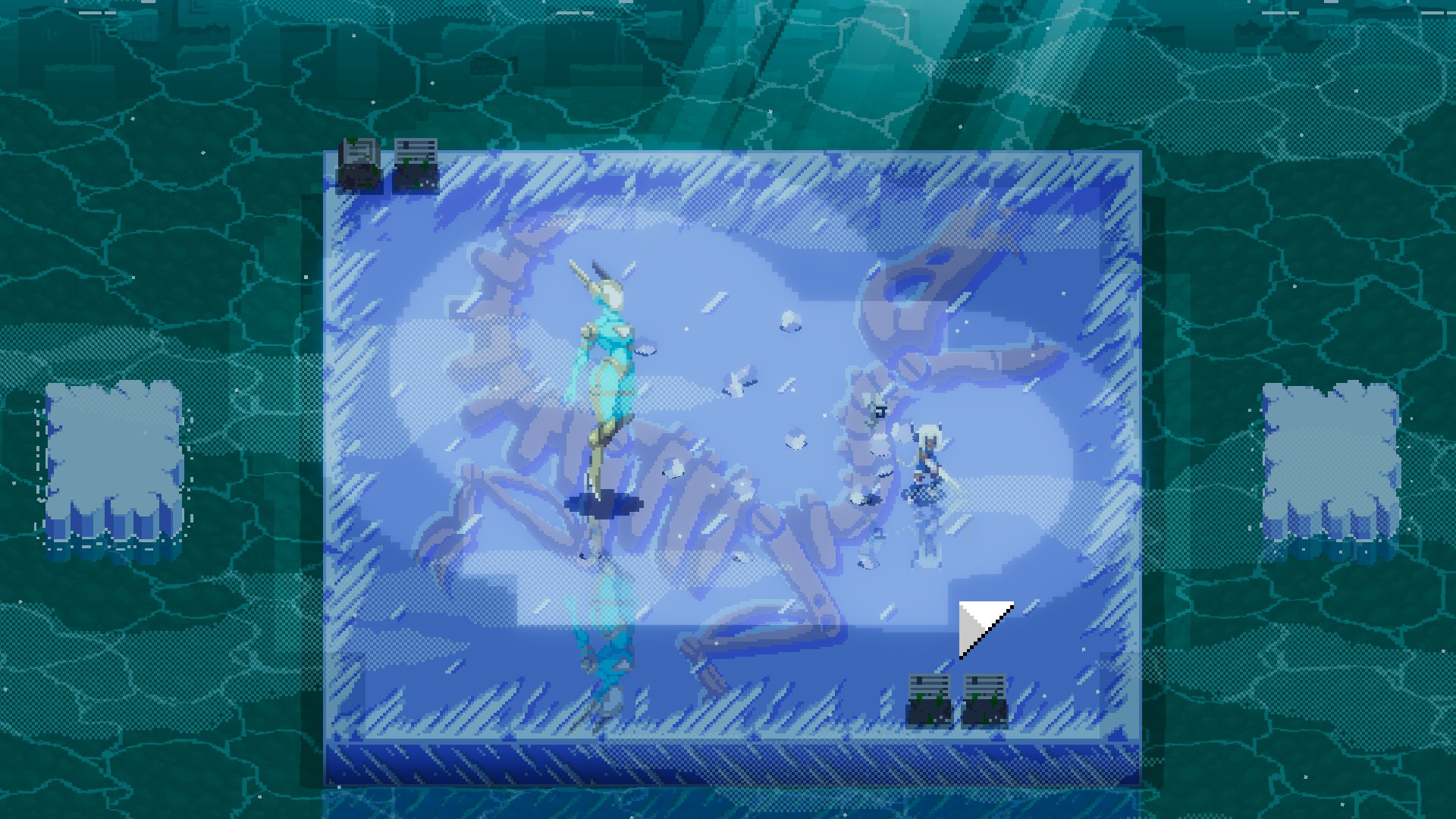
The decisions are still hard to make, though. Whose life is worth more? The martial artist who offers parry training, or the inventor who needs just a few more days to finish the upgrade that will let you add more perk chips in the field? The spider-legged robot who takes in dogs left behind by fleeing humans, or the gentle sharkbot who taught you to fish?
The biggest gaming news, reviews and hardware deals
Keep up to date with the most important stories and the best deals, as picked by the PC Gamer team.
(The clock stops during the fishing minigame, in case you were wondering. It also stops during dialogue, menus, cutscenes, and scene transitions. Unsighted is scrupulously fair about this stuff.)
Meteor dust isn't the only way to buy time, either. There's an NPC who offers you extra hours by taking them from others, a last-ditch option to prioritize your own life by scrolling down your list of contacts and choosing who to render unsighted. You're the last android still fighting to save everyone, after all. If you fail, they'll all be lost. Why shouldn't you? And yet, it feels wrong. It's worth paying close attention to who shows up on that list, and that's all I'll say about that.
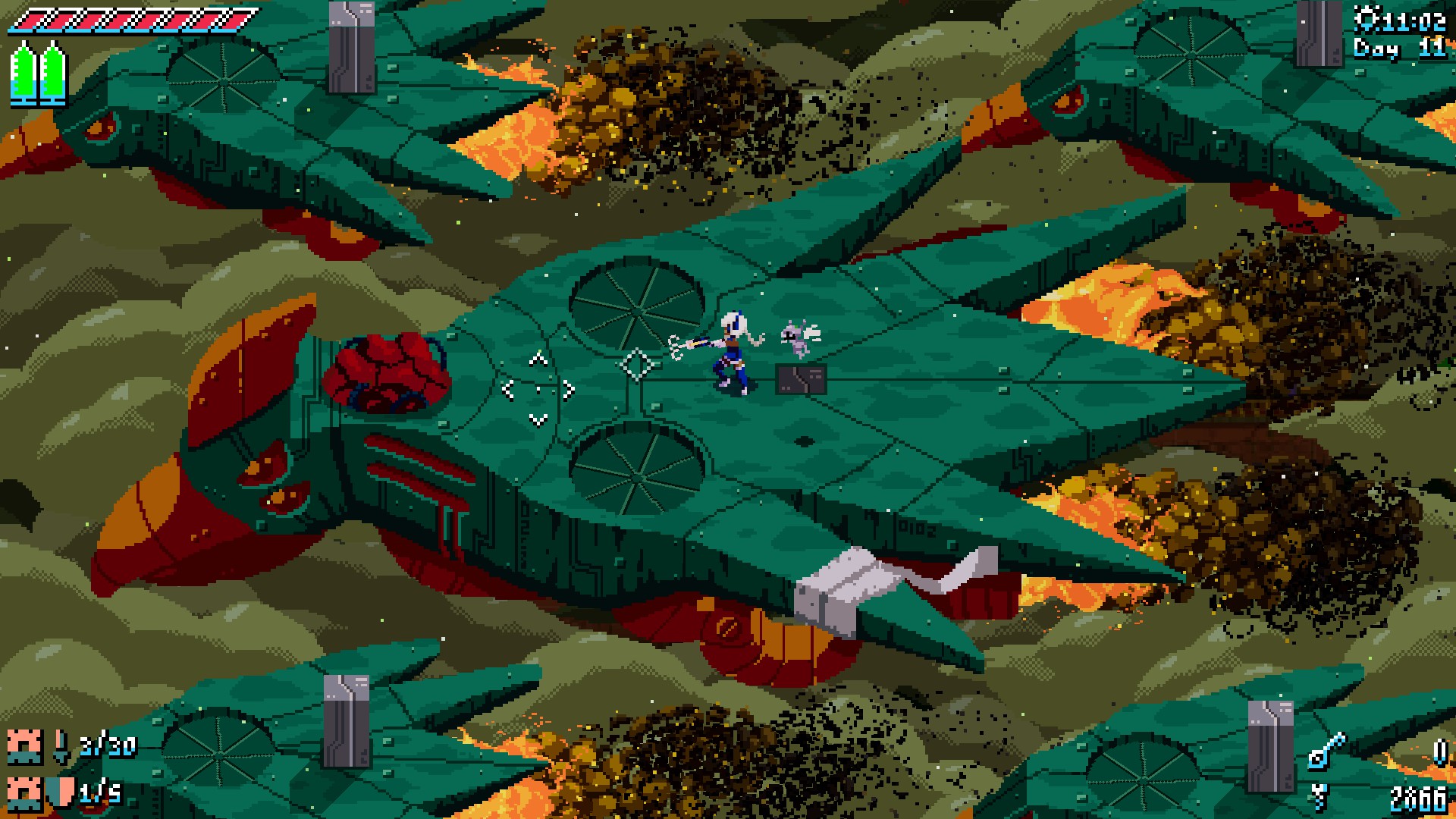
Unsighted has a slick soulslike combat system, all about timing and stamina management (and rushing back to where you died from the last savepoint to pick up the currency you lost). When I decide between waiting for an enemy to attack so I can attempt a perfect parry to set up a critical, or just running down my stamina bar with a flurry of wild attacks, I'm thinking about the clock. When I wonder if it's worth throwing ice grenades into the water to make platforms so I can explore upstream, I'm thinking about Teresa. Knowing you don't have forever makes every moment feel like it matters.
Your first time through, you'll probably lose a few NPCs. When I hit the slideshows at the end of my first run, Teresa was gone, and so was Ana the shopkeeper, Samuel the inventor, and the traveling salesbot I only crossed paths with a couple of times. Like the companions who died the first time I played Mass Effect 2's suicide mission, those losses hit hard because they weren't scripted. They were my fault, and I could trace them back to choices I'd made.
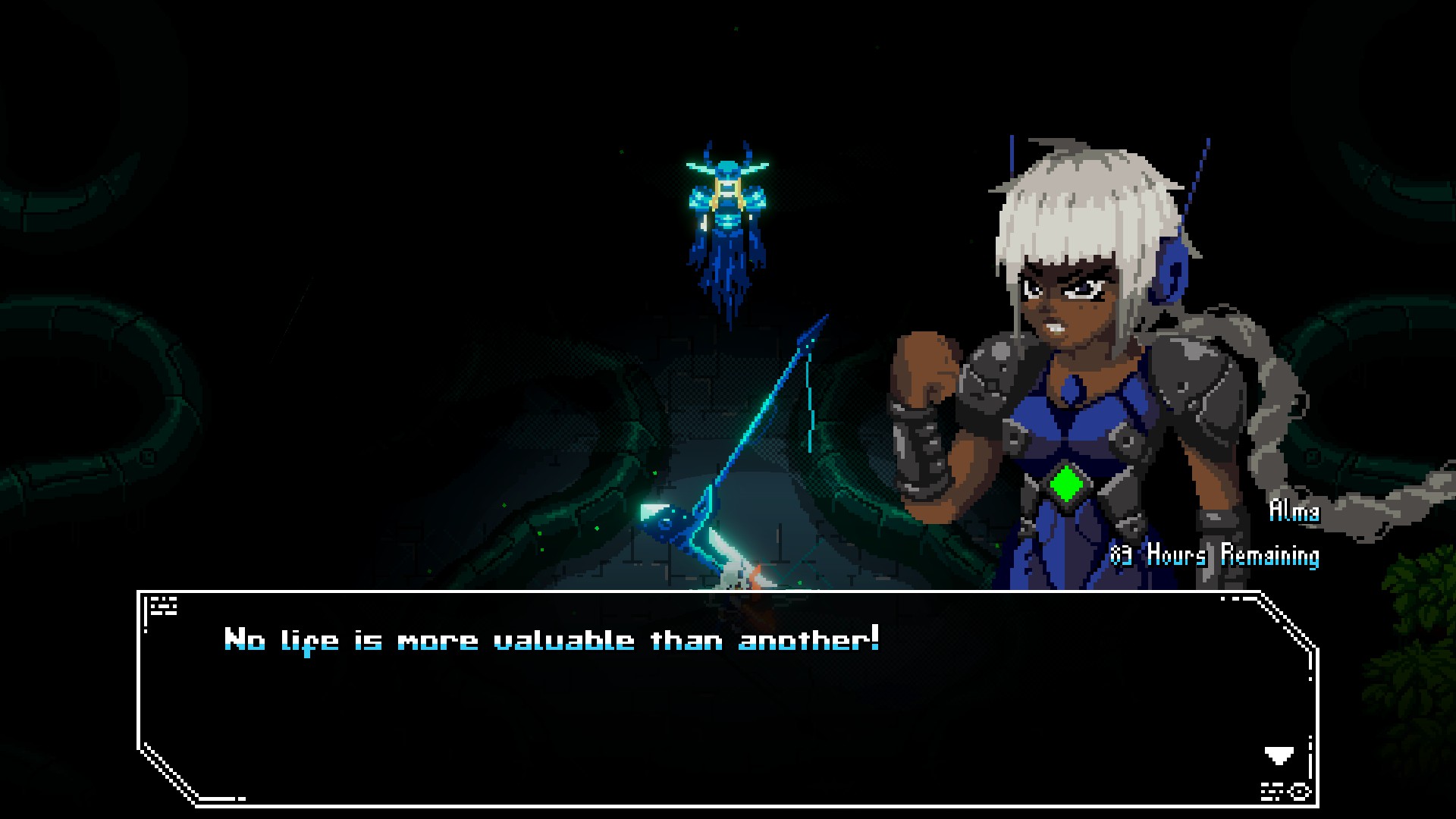
Maybe on my new game+ run I'll save them all. A single rip through story mode took me just over seven hours, which is short for the genre. Unsighted is a game that knows the value of time, and it doesn't waste yours. An efficient replay, knowing all the shortcuts and having hookshots from the start, would be even quicker.
But even playing it once, I was satisfied with the ending. I managed to save Cleo the sharkbot, who dedicated the rest of her life to cleaning up the waterways, and I saved a bunch of other automatons who went on to rebuild their village and preserve their history. Their achievements felt like mine as well.
You can knock Unsighted's difficulty down to explorer mode, increase the stamina bar and decrease the combat difficulty, but give the time limits a chance. I think they'll enrich your enjoyment of it, too.

Jody's first computer was a Commodore 64, so he remembers having to use a code wheel to play Pool of Radiance. A former music journalist who interviewed everyone from Giorgio Moroder to Trent Reznor, Jody also co-hosted Australia's first radio show about videogames, Zed Games. He's written for Rock Paper Shotgun, The Big Issue, GamesRadar, Zam, Glixel, Five Out of Ten Magazine, and Playboy.com, whose cheques with the bunny logo made for fun conversations at the bank. Jody's first article for PC Gamer was about the audio of Alien Isolation, published in 2015, and since then he's written about why Silent Hill belongs on PC, why Recettear: An Item Shop's Tale is the best fantasy shopkeeper tycoon game, and how weird Lost Ark can get. Jody edited PC Gamer Indie from 2017 to 2018, and he eventually lived up to his promise to play every Warhammer videogame.

